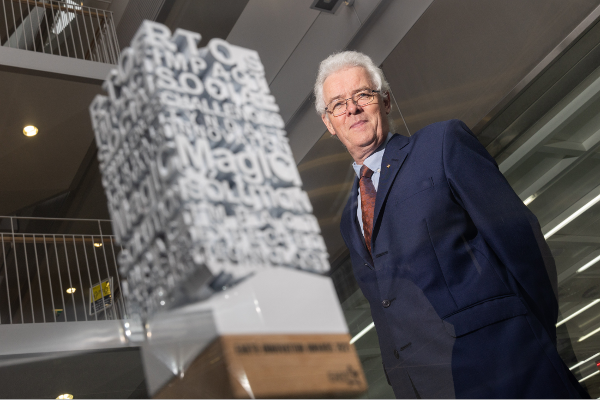
Professor Cian Ó Mathúna, a world-leading engineering scientist has been named the recipient of two major international awards celebrating innovative technology created in Ireland, which could have a lasting environmental impact.
Minimising energy consumption in electronics continues to be a major, technological challenge. Responding to this challenge, Professor Ó Mathúna, Head of MicroNano Systems at Tyndall National Institute, based at University College Cork, developed MagIC (Magnetics on Silicon), an innovative technology that can greatly extend the battery life of portable electronics and dramatically reduce the energy use of high-performance electronic systems and equipment.

Head of MicroNano Systems at Tyndall National Institute, UCC,
has received two international awards for his ground-breaking research on Magnetics on Silicon.
The ground-breaking impact of the technology, developed by Professor Ó Mathúna and his team, has recently been recognised with prestigious awards from the 400,000 member IEEE (Institute of Electrical and Electronics Engineers) and EARTO (European Association of Research and Technology Organisations) celebrating the global influence of Professor Ó Mathúna’s research on the semiconductor industry and recognising his impact on shaping future electronics technology.
The IEEE award celebrates Professor Ó Mathúna’s extraordinary, global influence and leadership, over the last decade, in bringing together the electronics industry and academia to collaborate toward the development of the Power Supply on Chip (PwrSoC). Furthermore, Professor Ó Mathúna is the first Irish recipient of an EARTO Award, which recognises key contributions from European research to high-impact, technological innovation.
Tyndall’s MagIC technology makes bulky magnetics components in electronic equipment disappear onto the silicon chip, just like Gordon Moore and colleagues did with the transistor over 50 years ago. Using MagIC technology electronics will be able to use power more efficiently by minimising the energy wasted or lost as the battery powers the microprocessor chip. This improved efficiency can extend the charge time of batteries by more than 50%. The breakthrough technology will have a huge impact on markets for mobile phones, IT equipment, and any device needing a battery.
This more efficient use of power represents big savings on the amount of energy we use globally to charge our personal devices. Currently, there are 15 billion mobile devices operating worldwide with this figure expected to increase to 18 billion by 2025. Tyndall’s MagIC technology could play a key role in reducing energy consumption in this sector.
Professor Ó Mathúna said:
“I’m so proud of the Integrated Magnetics Team and the work we’ve done in developing this technology over 27 years. Our achievements show the major impact Irish research is having on the global stage and places Tyndall and University College Cork at the forefront of the development of new energy management technology for batteries in portable electronics. We continue to partner extensively with global companies to develop and commercialise the technology which has already received more than €20M in funding from research, licensing and productisation. We have joint publications with companies such as Global Foundries in Dresden and Singapore; Intel, USA and Philips in the Netherlands. This ground-breaking and disruptive innovation is set to change the global approach to how power is managed in electronic devices and will contribute to addressing a critical environmental issue for society and our planet.”
